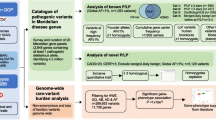Abstract
BRD7 (bromodomain 7), a subunit of poly-bromo-associated BRG1-associated factor (PBAF)-specific Swi/Snf chromatin remodeling complexes, has been proposed as a tumour suppressor protein following its identification as an important component of both functional p53 and BRCA1 (breast cancer 1, early onset) pathways. As low BRD7 expression levels have been linked to p53-wild-type breast tumour cells, we hypothesized an implication of BRD7 germline alterations in the pathogenesis of hereditary breast cancer similar to that of TP53 in Li-Fraumeni syndrome. We performed sequence analysis of the BRD7 gene on 61 high-risk individuals with hereditary or very-early-onset breast cancer and 100 healthy controls. Four potentially disease-causing single-nucleotide alterations were detected within the cohort of breast cancer patients (one listed as a rare single-nucleotide polymorphism (SNP) in the NCBI (National Center for Biotechnology Information) SNP database). Two of the detected variants were also each found once within the control collective. Segregation analysis on both families of those carrying the remaining two variants revealed segregation of these BRD7 alterations independent of breast cancer. In conclusion, it seems that the BRD7 variants we detected represent rare polymorphisms and mainly rule out BRD7 as a frequent high-penetrance breast cancer susceptibility gene. However, further analyses in larger cohorts of women with hereditary breast cancer should clarify the role of BRD7 in breast cancer predisposition.



Similar content being viewed by others
References
Drost J, Mantovani F, Tocco F, Elkon R, Comel A, Holstege H, Kerkhoven R, Jonkers J, Voorhoeve PM, Agami R, Del Sal G (2010) BRD7 is a candidate tumour suppressor gene required for p53 function. Nature Cell Biol 12:380–389
Harte MT, O’Brien GJ, Ryan NM, Gorski JJ, Savage KI, Crawford NT, Mullan PB, Harkin DP (2010) BRD7, a subunit of SWI/SNF complexes, binds directly to BRCA1 and regulates BRCA1-dependent transcription. Cancer Res 70:2538–2547
Beroukhim R, Mermel CH, Porter D et al (2010) The landscape of somatic copy-number alteration across human cancers. Nature 463:899–905
Burrows AE, Smogorzewska A, Elledge SJ (2010) Polybromo-associated BRG1-associated factor components BRD7 and BAF180 are critical regulators of p53 required for induction of replicative senescence. Proc Natl Acad Sci USA 107:14280–14285
Liu H, Zhang L, Niu Z, Zhou M, Peng C, Li X, Deng T, Shi L, Tan Y, Li G (2008) Promoter methylation inhibits BRD7 expression in human nasopharyngeal carcinoma cells. BMC Cancer 8:253
Miki Y, Swensen J, Shattuck-Eidens D et al (1994) A strong candidate for the breast and ovarian cancer susceptibility gene BRCA1. Science 266:66–71
Li FP, Fraumeni JF Jr (1969) Soft-tissue sarcomas, breast cancer, and other neoplasms. A familial syndrome? Ann Intern Med 71:747–752
Gonzalez KD, Buzin CH, Noltner KA, Gu D, Li W, Malkin D, Sommer SS (2009) High frequency of de novo mutations in Li-Fraumeni syndrome. J Med Genet 46:689–693
Lalloo F, Varley J, Ellis D, Moran A, O’Dair L, Pharoah P, Evans DG; Early Onset Breast Cancer Study Group (2003) Prediction of pathogenic mutations in patients with early-onset breast cancer by family history. Lancet 361:1101–1102
Ginsburg OM, Akbari MR, Aziz Z, Young R, Lynch H, Ghadirian P, Robidoux A, Londono J, Vasquez G, Gomes M, Costa MM, Dimitrakakis C, Gutierrez G, Pilarski R, Royer R, Narod SA (2009) The prevalence of germ-line TP53 mutations in women diagnosed with breast cancer before age 30. Fam Cancer 8:563–567
Wooster R, Weber BL (2003) Breast and ovarian cancer. N Engl J Med 348:2339–2347
Meindl A, Ditsch N, Kast K, Rhiem K, Schmutzler RK (2011) Hereditary breast and ovarian cancer: new genes, new treatments, new concepts. Dtsch Arztebl Int 108:323–330
Eeles RA (1995) Germline mutations in the TP53 gene. Cancer Surv 25:101–124
Tinat J, Bougeard G, Baert-Desurmont S, Vasseur S, Martin C, Bouvignies E, Caron O, Bressac-de Paillerets B, Berthet P, Dugast C, Bonaïti-Pellié C, Stoppa-Lyonnet D, Frébourg T (2009) 2009 version of the Chompret criteria for Li Fraumeni syndrome. J Clin Oncol 27:e108–e109
Antoniou AC, Beesley J, McGuffog L et al (2010) Common breast cancer susceptibility alleles and the risk of breast cancer for BRCA1 and BRCA2 mutation carriers: implications for risk prediction. Cancer Res 70:9742–9754
Acknowledgments
The authors gratefully acknowledge all women and their families for participating in this study, Friederike Grundstedt, Bernd Haermeyer, and Marcel Tauscher for their technical assistance in mutation analysis, and Gillian Teicke for her support in preparing the manuscript. This work was supported by the Hannover Biomedical Research School StrucMed doctorate program, GSC 108 (DFG – German Research Foundation).
Conflict of interest
The authors declare that they have no conflict of interest.
Author information
Authors and Affiliations
Corresponding author
Rights and permissions
About this article
Cite this article
Penkert, J., Schlegelberger, B., Steinemann, D. et al. No evidence for breast cancer susceptibility associated with variants of BRD7, a component of p53 and BRCA1 pathways. Familial Cancer 11, 601–606 (2012). https://doi.org/10.1007/s10689-012-9556-0
Published:
Issue Date:
DOI: https://doi.org/10.1007/s10689-012-9556-0




